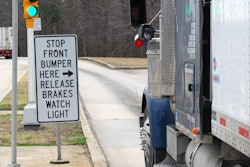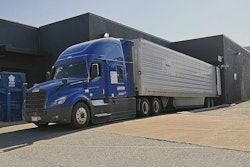Trucking news and briefs for Tuesday, May 13, 2025:
Owner-ops show business optimism despite economic uncertainties
Nearly two-thirds of owner-operators and small fleet owners surveyed recently by Bloomberg and Truckstop believe that tariffs may hinder the trucking industry. That was before President Donald Trump announced an agreement with China over the weekend that temporarily slashes tariffs between the nations.
That deal includes a reduction in the 145% and 125% tariffs the countries have levied on each others' imports. Under the new agreement, U.S. tariffs on Chinese goods will fall to 30%, and China will levy a 10% tariff on American products starting Wednesday that will last for at least 90 days.
According to the latest Bloomberg | Truckstop survey conducted prior to the U.S-China deal, 65% of owner-operators and small fleets believed that tariffs may hinder the industry. Despite that, a majority remained optimistic about the short-term, with 62% expecting sustained demand and 55% bullish about rate growth.
“Carriers aren’t turning a blind eye to the potential volatility that could arise from tariffs,” said Lee Klaskow, senior freight transportation and logistics analyst at Bloomberg Intelligence. “However, most carriers believe rates and volumes still have some room to grow and many believe that the worst of the challenging freight conditions may be over.”

[Related: Prospects for a 'phenomenal' flatbed year: Trucker of the Month George Kincaid]
The Bloomberg | Truckstop Q1 2025 Truckload survey also showed resilience among motor carriers. While many carriers remain optimistic that demand and rate recovery may be on the horizon, there are also concerns about the potential impact of the new administration’s policies on the freight landscape. Despite that, 57% of respondents said they plan to stay on as either owner-operators or company drivers, a seven-percentage-point increase compared to the Q4 2024 survey.
Additionally, truckload volumes showed modest improvement in the first quarter, with 25% of respondents reporting year-over-year load growth -- an increase of 11 percentage points compared to the fourth-quarter poll. Demand growth also outperformed typical seasonal trends, which was attributed to pull-forward activity ahead of anticipated tariffs.
Carriers reported they were optimistic U.S. policies will boost domestic freight activity, largely looking past inflation concerns, with 62% of respondents expecting demand to increase over the next 3-6 months, up seven percentage points from the fourth quarter.
Carriers also expressed optimism about spot rates, with 55% now expecting an increase over the next three to six months -- a four-percentage-point improvement from the Q4 survey. Bloomberg and Truckstop noted that the uptick in sentiment here “likely reflects a more favorable rate environment in the first quarter, as 19% of carriers reported year-over-year rate improvements, up six percentage points from the fourth-quarter survey.”
More recent sluggishness for reefer rates, tumbles for vans and four weeks of modest declines for flatbeds after a run-up early in the year could all portend less optimism in the current quarter's survey to come.
FTR and Truckstop noted that the most recent week's declines in spot rates were generally in line with seasonal expectations for early May. For dry van haulers, though, rates have now fallen to the lowest level since June 2020.
Total all-in rates for all three segments during the last week were about 3% higher year-over-year but were down close to 5% versus the five-year average for the week, the firms added.
The complete survey is available to Bloomberg Terminal subscribers via Bloomberg Intelligence.
Diesel prices hit 2025 low
The price of diesel fuel at the pump reached its lowest point of 2025, according to the latest weekly update from the Energy Information Administration.
During the week ending May 12, the national average for a gallon of on-highway diesel fell to $3.48, the lowest mark since the week ending Dec. 23, 2024, when fuel was at the same price. Over the last five weeks, fuel prices have fallen 16 cents.
The most recent week saw fuel prices fall in most regions, with increases only being seen in California, which saw a 3.2-cent increase for the nation's most expensive fuel now at $4.76/gal, and the Rocky Mountain region, where prices rose three-tenths of a cent.
The largest decreases were seen in the Lower Atlantic and Gulf Coast regions, 4 cents and 3.1 cents respectively.
The nation’s cheapest diesel is in the Gulf Coast region at $3.14/gallon, followed by the Lower Atlantic region at $3.41/gal. California's most-expensive standing is followed by New England at $3.88/gal.
Prices in other regions, according to EIA:
- Central Atlantic -- $3.78
- Midwest -- $3.42
- Rocky Mountain -- $3.46
- West Coast less California -- $3.74
ProMiles’ diesel averages during the same week showed prices falling 2.3 cents to $3.48/gal. According to the ProMiles Fuel Surcharge Index, the most expensive diesel can be found in California at $4.88, the cheapest in the Gulf Coast region at $3.15.
[Related: Fuel taxes: Finding the cheapest fuel about more than just pump price]
Colorado bill to allow roadside chain-assistance companies heads to governor’s desk
The Colorado legislature has approved a bill that, if signed into law by Gov. Jared Polis, would allow private companies to install or remove tire chains at designated roadside locations.
The bill -- SB25-069 -- passed the state’s Senate with a 33-2 vote, with the state’s House approving the bill with a 54-11 vote.
If signed into law, companies will be allowed to obtain a permit from the Colorado Department of Transportation that allows the permit holder to, for a fee, install or remove tire chains or alternate traction devices at a location designated in the permit. CDOT can place conditions on the permit concerning the safe and orderly movement of traffic. CDOT is also instructed to avoid monopoly-type situations at specific locations.
The bill is intended to improve compliance with new chain laws signed into law last year in the state. That law, which took effect Aug. 7, 2024, requires all commercial motor vehicles (CMVs) over 16,000 pounds from Sept. 1 to May 31 to carry four snow chains or adequate alternate traction devices on their trucks if they are using any of the following roads:
- I-70 west of milepost 259 (Morrison)
- Colorado Hwy 9 milepost 63 to milepost 97 (Frisco to Fairplay)
- Route 40 west of milepost 256 (Empire)
- US Route 50 west of milepost 225 (Salida)
- US Route 160 west of milepost 250 (Morrison)
- US Route 550 from milepost 0 to 130 (State line south of Durango to Montrose)
The law also bars trucks from using the left lane in the following areas:
- Glenwood Canyon
- Dowd Junction (The curvy section of I-70 between Avon and Vail)
- The west side of Vail Pass
- The tunnel grade on both sides of the Eisenhower-Johnson tunnels
- Georgetown Hill
- Floyd Hill
[Related: Colorado eyes allowing roadside chain-assist businesses]









